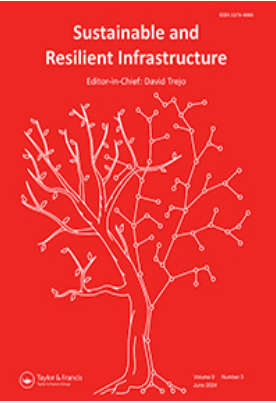The effect of ductility on the seismic collapse risk of residential steel moment-resisting frames at Alborz and Zagros Seismic zones, Iran
IF 2.2
Q2 ENGINEERING, CIVIL
引用次数: 0
Abstract
ABSTRACT In this paper, seismic hazard curves are selected for four different sites at Alborz and Zagros seismic zones with underlying conditions of soft and hard soil. Three residential steel moment-resisting frames (SMRFs) with 3, 5, and 7 stories are designed and modeled for each site to perform cloud analysis, implementing more than 300 far-field as-recorded ground motions. Using the results of regression-based cloud analysis, robust fragility curves are developed for each SMRF, and by combining the fragility curve with the hazard curve, the annual rate of collapse (i.e., collapse risk) is calculated for each SMRF. Furthermore, the important levels of peak ground acceleration (PGA) that greatly contribute to the collapse risk of each SMRF are obtained by exploiting the collapse deaggregation curves, which are composed up of fragility curves, derivative of hazard curves, and the annual rates of collapse. It was found that a strong correlation exists between ductility and the collapse risk of SMRFs at both seismic zones and underlying soil conditions, where increasing the ductility of SMRFs results in a decreased risk of collapse. It was also found that the important levels of the PGA contributing to the collapse risk of the SMRFs are inclined towards greater values as the ductility increases. The 5-storey SMRFs exhibited the least ductility and the highest collapse risk at both seismic zones and soil conditions, while the 3-storey SMRFs were the most ductile ones with the least risk of collapse.延性对伊朗Alborz和Zagros地震带住宅钢抗弯矩框架地震倒塌风险的影响
摘要本文选取了Alborz和Zagros地震带四个不同场地的地震危险性曲线,其下伏条件为软土和硬土。为每个场地设计和建模了三个3层、5层和7层的住宅钢抗弯框架(SMRF),以进行云分析,实现了300多个远场记录的地面运动。利用基于回归的云分析结果,为每个SMRF制定了稳健的脆弱性曲线,并通过将脆弱性曲线与危险性曲线相结合,计算出每个SMRF的年坍塌率(即坍塌风险)。此外,通过利用由脆弱性曲线、危险曲线导数和年坍塌率组成的坍塌分解曲线,可以获得对每个SMRF的坍塌风险有很大贡献的重要峰值地面加速度(PGA)水平。研究发现,在地震带和下伏土壤条件下,SMRF的延性和坍塌风险之间存在很强的相关性,增加SMRF的延展性会降低坍塌风险。还发现,随着延性的增加,对SMRF坍塌风险有贡献的PGA的重要水平倾向于更大的值。在地震带和土壤条件下,5层SMRF表现出最低的延展性和最高的坍塌风险,而3层SMRF是延展性最强、坍塌风险最小的SMRF。
本文章由计算机程序翻译,如有差异,请以英文原文为准。
求助全文
约1分钟内获得全文
求助全文
来源期刊

Sustainable and Resilient Infrastructure
ENGINEERING, CIVIL-
CiteScore
7.60
自引率
10.20%
发文量
34
期刊介绍:
Sustainable and Resilient Infrastructure is an interdisciplinary journal that focuses on the sustainable development of resilient communities.
Sustainability is defined in relation to the ability of infrastructure to address the needs of the present without sacrificing the ability of future generations to meet their needs. Resilience is considered in relation to both natural hazards (like earthquakes, tsunami, hurricanes, cyclones, tornado, flooding and drought) and anthropogenic hazards (like human errors and malevolent attacks.) Resilience is taken to depend both on the performance of the built and modified natural environment and on the contextual characteristics of social, economic and political institutions. Sustainability and resilience are considered both for physical and non-physical infrastructure.
 求助内容:
求助内容: 应助结果提醒方式:
应助结果提醒方式:


